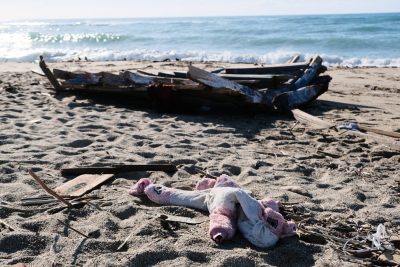Two Shipwrecks Reveal the State of the World
The rich get a rescue mission, the poor get nothing.

All Global Research articles can be read in 51 languages by activating the Translate Website button below the author’s name.
To receive Global Research’s Daily Newsletter (selected articles), click here.
Click the share button above to email/forward this article to your friends and colleagues. Follow us on Instagram and Twitter and subscribe to our Telegram Channel. Feel free to repost and share widely Global Research articles.
***
The sinking of two vessels—the Andrianna, filled with hundreds of desperate migrants, and the Titan, with a handful of multi-millionaires—provides a vivid picture of the world today. All drowning deaths in the ocean are tragic, and one has to sympathize with the families who have lost loved ones. Yet these events also dramatically demonstrate global economic inequality and injustice.
Those who died on the Titan have names. Stockton Rush, chief executive and founder of OceanGate, was the pilot of the Titan. Hamis Harding was a British businessman, chairman of Action Aviation based in Dubai, and an explorer. Paul-Henri Nargeolet was director of underwater research for RMS Titanic, Inc., an American firm that owns the rights to the wreck of the Titanic. And finally, Shazad Dawood and his 19-year-old son Sulem Dawood were scions of one of Pakistan’s wealthiest families.
The four passengers paid $250,000 each for the macabre adventure of descending to 12,500 feet below the surface to see the wreckage of the Titanic where 1,517 people died after the ship hit an iceberg in 1912. The vessel went missing on June 18. The U.S. and Canadian coast guards did everything possible, dispatching ships and planes to locate and save those five. But debris found on June 22 indicates that the submersible vessel apparently imploded.
By contrast, many of those who died when the Andrianna capsized on June 14 still have no names. The ship, an overloaded fishing vessel, sailed from Libya to Italy, carrying between 400 and 750 migrants from various countries. Some 104 were rescued, hundreds of others remain unaccounted for, many of them women and children who were below decks. There were Egyptians, Syrians, Pakistanis, Afghans, and Palestinians among the survivors and perhaps other nationalities among the dead. These passengers were mostly poor people heading for Europe in the hope of finding a way to make a better living and take care of themselves and their families.
But many European governments don’t want any more immigrants, particularly poor people of different nationalities, colors, religions, and languages. With rightwing governments in power in several European countries, all semblance of solidarity has disappeared. The Greek Coast Guard saw that the vessel was in trouble but declined to assist it.
Here, then, is the split screen reality of those who sail the high seas. The rich can pay hundreds of thousands of dollars for an undersea adventure, while the poor spend the last of their savings to crowd onto an overloaded fishing boat in hopes of getting to Europe and finding a job. Governments mobilize their resources to rescue the rich, but turn their backs on the poor in distress. The sinking of these two vessels should lead Europeans and people around the world to examine their consciences.
What would it have been like if the million dollars that those four individuals spent to visit the Titanic had been spent instead on helping those several hundred migrants? Let’s take it one step further. There are about 45 million migrants in the world today, driven by climate change, economic crises, and oppressive governments. Taxing the global rich, who clearly have more money than they need, could provide considerable resources for addressing this migration crisis.
*
Note to readers: Please click the share button above. Follow us on Instagram and Twitter and subscribe to our Telegram Channel. Feel free to repost and share widely Global Research articles.
Dan La Botz is a member of the New Politics editorial board and of Internationalism from Below.
Featured image: Shipwreck in Italy in March 2023 (Shutterstock)

